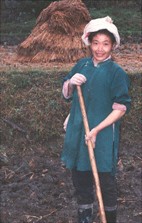Nyaw in Thailand

Photo Source:
Copyrighted © 2026
Peoples of Laos, Asia Harvest All rights reserved. Used with permission |
Send Joshua Project a map of this people group.
|
| People Name: | Nyaw |
| Country: | Thailand |
| 10/40 Window: | Yes |
| Population: | 83,000 |
| World Population: | 102,000 |
| Primary Language: | Nyaw |
| Primary Religion: | Buddhism |
| Christian Adherents: | 1.00 % |
| Evangelicals: | 0.00 % |
| Scripture: | Translation Started |
| Ministry Resources: | No |
| Jesus Film: | No |
| Audio Recordings: | Yes |
| People Cluster: | Tai |
| Affinity Bloc: | Southeast Asian Peoples |
| Progress Level: |
|
Introduction / History
China is the original homeland of the Nyaw, and most other tribes now living in northern Thailand. They gradually migrated southward due to pressure by the Chinese. As they traveled, they conquered many peoples along the way. By the tenth century, Thailand was their home.
Most of the tribes in northwestern Thailand live along the lower slopes of the mountains. They speak various languages which come from either the Mon-Khmer or Tai group. Most of the people are bilingual, speaking both their own language and Northern Thai. Many also use the Northern Thai script.
Northern Thailand is the site of the early Mon kingdom, which was founded in the sixth century. The kingdom fell to the Thai during the thirteenth century, and this allowed the northwestern region to remain independence from Bangkok until the late nineteenth century. From that time forward, tribes like the Nyaw have had to answer to the Thai government.
What Are Their Lives Like?
Most of the tribes live in the mountainous areas of northern Thailand where they practice the slash and burn method of farming. Unfortunately, this has caused many of the tropical forests that grow naturally in this region to be destroyed. For this reason, the tribes must continually move their villages. Although the farmers have been encouraged by the Thai government to move to the plains and cultivate rice in irrigated fields, many have continued to use the slash and burn method.
Rice is the staple crop for most of these groups. They also raise maize and opium poppies. The Nyaw cultivate dry rice with a digging stick rather than with a plow or oxen. Those who grow rice for consumption and sale still use simple wooden farm equipment drawn by buffalo.
For years, opium was the major source of cash among the tribes. However, because of the gradual suppression of the opium trade, the government has encouraged the people to raise pigs and peppers instead.
Nyaw villages are located either on raised ground surrounded by rice fields, or on high ground on either side of a road or pathway. There are various types of houses in the villages. The wealthier people often live in sturdy, mahogany homes that are raised off the ground and have plank floors and tile roofs. Those with lower incomes may live in thatched roof, bamboo houses with dirt floors.
The people of this region are very polite, respectful, and hospitable. The family is the basic unit of society. Beginning at a very young age, they teach their children proper social behavior. They base this code of conduct on having respect for those with higher rank. Social rank is organized based on age, occupation and wealth. For example, they rank rural farmers below artisans, merchants and city government officials. The priests form their own separate class.
The single most important social institution in the village is the Buddhist temple. It symbolizes unity among the villagers and provides a wide variety of activities.
What Are Their Beliefs?
Buddhism was introduced into Thailand in 329 B.C.; and today, most of the Nyaw profess to be Buddhist. Most have mixed elements of Buddhism with their traditional animistic beliefs (the belief that non-living objects have spirits). They often seek help through supernatural spirits and objects. Ancestor worship (praying to deceased ancestors for provision and guidance) is also common. They think their ancestral spirits cause illnesses if they do not appease them. Families usually have small altars near their homes where they make sacrifices and offerings to the spirits. The people also believe that each village has a guardian spirit, as well as various spirits that are linked to the elements of nature.
What Are Their Needs?
The Nyaw people need to put their faith only in the King of kings and Lord of lords. They need to make a way for Christ to transform their lives so they can experience life to the full.
Prayer Points
Pray for Nyaw people in Thailand to have open and receptive hearts, and that they would encounter the King of kings.
Pray that movements to Christ would explode, as followers make followers, and that they would place their identity in Christ.
Ask God to raise up prayer teams who will begin breaking up the spiritual soil through worship and intercession.
Ask the Lord to bring forth a vigorous Nyaw church for the glory of his name!